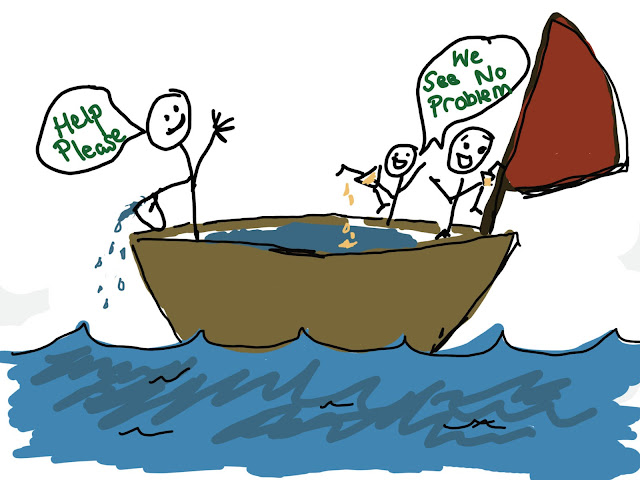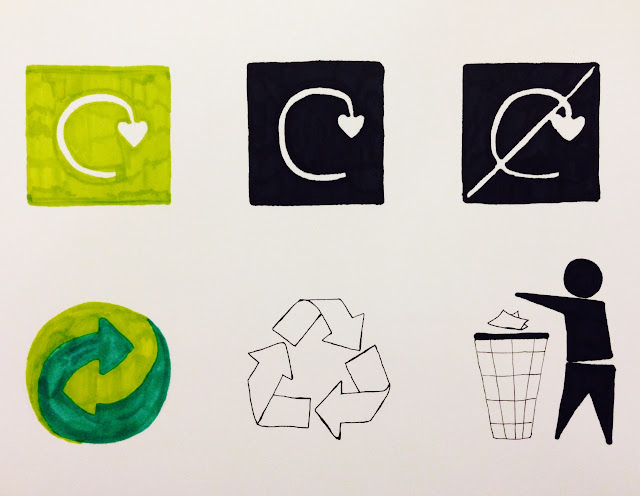Shoveling Water out of a Sinking Boat (While Smiling)
I recently had to do a presentation for a job interview and decided to do it on "Conservation Optimism" (https://conservationoptimism.com/), which involves staying positive while facing the onslaught of problems that we are going through. For this, I came up with 4 mindsets to keep me going when I get down and just want to give up. After all, it can get degrading when you are trying hard to make inconvenient changes to your life, but others aren't bothered. It can sometimes feel that you are just shoveling water out of a sinking boat, whilst some people sit smugly spilling their cocktails, getting endless refills, and only making the problem worse. The fact is that Earth is like a sinking boat; we will inevitably run out of space and resources. The difference we can make, however, is reducing the speed at which this happens, protecting what we have left, and trying to live sustainably in as many ways as we can. We have to be resourceful and know that we are making a difference.
 |
| Useful diagram depicting elaborate analogy |
Here are my 4 mindsets (nice & simple to keep you shoveling that water):
1) You have the power to say "no":
It's time to get awkward, and the more you do it, the less awkward it will feel. Learn to love the looks of bewilderment that you receive and know to educate people about why you are acting so strangely because that's just the new planet-loving you. Oftentimes,
plastic is single-use and is really unnecessary, so just by saying no you are
decreasing waste.
You don’t have to have 2 straws in a cosmopolitan cocktail (or even 1),
just ask the bartender beforehand to leave them out. Companies such as
Wetherspoons and Wagamama are getting the hint and are going to be supplying
them only on a request basis and replacing them with paper alternatives.
Simply by saying no, you are giving companies feedback on where to avoid waste. As no company wants to be wasting money, eventually changes should happen. For the super brave "NO" people: I've heard that if you have any unnecessary packaging on groceries, you should unpackage them and leave the waste for the supermarket to deal with at the checkout. Make it more inconvenient for them to have packaging and things may change.
2) Become a detective:
Picture this: You've seen a friend post online that using recycled toilet paper is much better for the environment than the bog-standard one you've been using (excuse the pun), so you go to your favourite supermarket website to see if they sell it and, what joy, they do! You are an environmental saviour! You put it in your basket, but suddenly you get a sneaking suspicion that something is not right. The Inspector Gadget theme tune comes on in your head and you go into detective mode. You think to yourself, what am I actually buying here? Surely my trusted supermarket would not try to sell me recycled loo roll in a non-recyclable wrapper that will be damaging to this glorious planet and all that live on it? You decide to research further and finally discover that no big-name supermarkets sell truly environment-focused toilet roll and so have to look elsewhere (e.g. https://www.naturalgrocery.co.uk). You realise this environment-friendly thing is not so easy after all. (For anyone who needs help creating this scene in your head, here is the link to the Inspector Gadget theme: https://www.youtube.com/watch?v=e-JHfXVlkik)
In short, companies want to sell you products and will tell you what you want to hear rather than what you need to hear. This makes it difficult to avoid plastic if you don’t know it’s there. By becoming a detective, you are taking the responsibility to research what to avoid, and it will gradually become easier. For example, plastic is often used in tea bags, so switching to loose leaf teas or investigating tea bags that don’t use a plastic seal, like the co-op are planning to introduce, would be a new way forward.
3) Be innovative:
Society coped before plastic was invented in the mid 1800s, so there are definitely ways of living without it. Having worked for the cosmetics company LUSH, I have seen them innovate ways of reducing packaging such as bottle free shower gels released last Christmas. Being a detective, I also wonder whether Lush recycle the plastic moulds they use to create these shower gels (I truly hope so). You can easily reduce plastic by using a bamboo toothbrush and carrying a metal straw (check out https://www.sas.org.uk/collection/eco-living/ ), as well as reducing your carbon footprint by switching to LED lightbulbs and recycling by shopping at charity shops. If you need an eco-friendly alternative to something then pop it into Google and you never know what might come up. If you can’t find an alternative, then you can try to innovate and get creative yourself!
4) Do what you can:
Not
all of us can afford to invest in solar panels and electric cars yet, which is
understandable, but it is our responsibility to make the changes we can afford
while educating others, and then we can tackle these problems as a team. A great example
of how to do what you can and being flexible with it is through the campaign
Meat Free Monday. Apparently, a way of reducing your carbon footprint by up to 1/3 is by
eating vegetarian or vegan meals. This is because rearing animals takes a lot
of energy and space, as well as livestock such as cows producing high levels of
methane which contributes to global warming, If we cut out the middle man and grow
plant based foods in the areas where animals graze and their food is grown,
there would be a much more efficient food system. Not everyone can go full on
veggie or vegan as it can pose health risks for some people, so going meat-free
on Mondays is a fantastic compromise, where you help out animals as well as
cutting down your carbon footprint.
If what you can do is be a superhero and cut out plastics and all crappy things then I have a few useful websites. http://www.plasticfreejuly.org/personal-care.html is a great guide to where you can get different products to helping you live plastic free. Unfortunately, this requires a big investment to start with, but you will start noticing a reduction in your spending further down the line. https://thezerowaster.com/zero-waste-living-uk/ links you to a list of shops where you can buy food and zero waste items in different areas of the UK.
I hope this post has been useful as I've tried to fill it in with great websites. Judging by my random bursts of crying today, the next post will be about sustainable sanitary wear, so check in if you are interested in ending period pollution. Please keep sending me great info and websites, they are so helpful!
Thanks for reading,
Liv
P.S. If you are celebrating Easter and are conscious that lots of products aren't environmentally focused, here is a link with some good ways to have fun https://www.hubbub.org.uk/blog/diy-easter (thanks Holly!)


Comments
Post a Comment